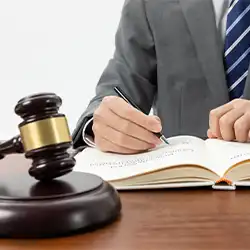Navigating the intricacies of the criminal justice system can be overwhelming, especially when facing felony charges. Understanding the process and timeline for getting a trial date is crucial in navigating this complex landscape.
As a criminal defense lawyer with years of experience, I will tell you everything you need to know about getting a court date for a felony charge.
Quick Summary
- The timeline for felony cases varies depending on custody, and potential outcomes include plea bargains and jury trials.
- It is essential to understand the stages involved in a felony case, from arrest to closing arguments.
- A felony case can result in various outcomes, such as plea bargains, jury trials, dismissals, etc.
How Long Does It Take To Get A Court Date For A Felony?

In some cases, an initial court date can be set within a few days or weeks, while more serious cases may take months to get before a judge.
Defendant Is In Custody
When a defendant is in custody, a trial date must be provided within 48 hours of arrest [1].
This timeline is crucial to protect the defendant's constitutional rights and unlawful detention.
It is important to contact an experienced criminal defense attorney when dealing with law enforcement officers as soon as possible to ensure your rights are protected throughout the criminal process.
Defendant Is Out Of Custody
For defendants out of custody, the timeline for an arraignment hearing may take weeks or even months leading up to the arraignment date.
This extended timeframe allows the defendant and their attorney to prepare for the case and gather evidence to support their defense.
Stages And Timelines Of A Felony Case
A felony case involves several stages, each with its timeline.
These stages include arrest or notice to appear, initial appearance (advisory), arraignment, formal charges, pretrial proceedings, trial procedures, and sentencing.
Understanding the specific timeline for each stage is crucial in ensuring your rights are protected and fully prepared for each step of the criminal process.
Remember that although the 6th Amendment guarantees the defendant's right to a speedy trial, it is not always guaranteed, especially if you do not have a dedicated lawyer.
The right to a speedy trial implies receiving a prompt and impartial jury trial once the felony case has commenced.
Arrest Or Notice to Appear
Following an arrest or notice to appear for a felony, the defendant will be processed at a local police station or jail, and details such as photographs, fingerprints, and felony charges will be documented [2].
I strongly advise not to converse with the police until your legal representative, specializing in criminal defense, is present.
If charges are filed directly by the state attorney, the defendant will receive a Notice to Appear in the mail.
The Initial Appearance
The initial appearance, also known as the advisory, is the defendant's first court appearance after arrest and typically takes place within 24 hours of the arrest [3].
During this hearing, the defendant is informed of their rights and the charges brought against them.
Arraignment
The arraignment is the initial court appearance that takes place after an arrest [4].
During this process, the defendant is informed of the charges against them, enters a plea, and the judge sets bail.
The arraignment process continues with a subsequent court date established for a preliminary hearing.
This hearing explores the evidence and any possible plea arrangements.
If the defendant chooses not to attend, their counsel may submit a Not Guilty Plea and Demand for Trial by Jury, allowing the court clerk to enter a not guilty plea on their behalf.
Formal Charges
Formal charges are the official accusations made by the State Attorney against a defendant.
The District Attorney files these charges and outlines the specific criminal offenses the defendant is accused of committing.
Pretrial Proceeding
The preliminary hearing is a crucial stage where the prosecution and defense discuss the case's particulars and ascertain a trial date.
During this stage, the defense can question the prosecution's witnesses and present evidence that may discredit the case or establish mitigating factors.
Trial Procedure

Both sides will have an opportunity to give their respective arguments and provide evidence to support their case.
The prosecutor then calls and questions witnesses on direct examination, followed by the defense attorney cross-examining witnesses.
Sentencing
If the defendant is found guilty, the sentencing process begins.
Sometimes, a separate sentencing hearing may be held, where the prosecution and defense present evidence to determine an appropriate sentence.
The penalties for a felony conviction can be severe, including fines, court charges, community service, or incarceration.
"The defendant may waive this right and agree to a court-decided trial date that extends beyond the 60 days. This buys the defense attorney more time to gather sufficient evidence and refute the prosecution's arguments."
- Steven Bell, Partner & Trial Attorney at Meltzer & Bell, P.A.
Potential Outcomes Of A Felony Case

Each outcome has advantages and disadvantages; understanding these possibilities is essential in making informed decisions throughout the criminal process.
Plea Bargains
A plea bargain is when a defendant agrees to plead guilty to a less severe charge in exchange for a reduced sentence or other benefits.
This agreement is made with the prosecutor.
Jury Trials
In a jury trial, a group of citizens, referred to as a trial jury or petit jury, determines the defendant's guilt or innocence.
The goal of a jury trial is to prove, without giving any room for doubt, that the defendant has committed the crime.
Dismissals And Other Outcomes
A dismissal in a felony case signifies that the charges against the defendant have been nullified and the case has been concluded.
This is the most favorable outcome for the defendant.
FAQs
1. Am I Always Eligible For A Plea Bargain?
No, you are not always eligible for a plea bargain. Depending on the severity of your case, the prosecutor may offer a plea bargain agreement.
2. How Long Does It Take For A Felony Case To Go To Trial?
The amount of time it takes for a felony case to go to trial is 256 days. However, this timeframe can vary depending on the jurisdiction and the case's complexity. Factors such as the availability of witnesses and evidence and the complexity of the charges can influence the time required for a felony case to reach a trial.
3. What Should I Expect at My First Felony Court Date?
At your first felony court date, you may go through an arraignment where the charges are read, and you enter a plea. The court may also set future dates for hearings or the trial.
4. Can I be Released on Bail Before My Felony Court Date?
Depending on the nature of the charges and the jurisdiction, you may be eligible for bail before your felony court date. The court will consider factors such as the severity of the crime and your criminal history.
Talk To An Experienced Attorney Today
When dealing with criminal charges, promptly contacting an experienced criminal defense attorney is important. Consulting an attorney can assist you in comprehending your rights, traversing the intricate court procedures, and providing the most effective defense for your case or your loved ones.
At Schmidt & Clark, LLP our experienced criminal defense attorneys are committed to providing our clients with the highest legal representation and support.
References:
- https://www.courts.ca.gov/1069.html
- https://www.ojp.gov/pdffiles1/Digitization/148118NCJRS.pdf
- https://www.law.cornell.edu/rules/frcrmp/rule_5
- https://www.justice.gov/usao/justice-101/initial-hearing

 Published by
Published by 
